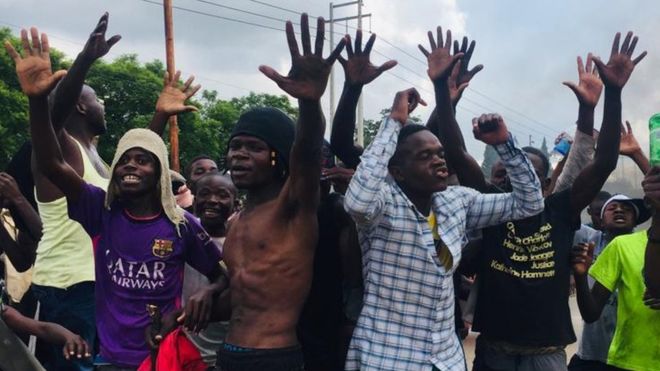Zimbabwe Protests after Petrol and Diesel Price Hike
Protests have broken out in Zimbabwe’s two main cities following the more than doubling of the fuel price.
Burning tyres and boulders have been used to barricade roads and block buses from carrying passengers.
President Emmerson Mnangagwa said the fuel price rise is aimed at tackling shortages caused by an increase in fuel use and “rampant” illegal trading.
Zimbabwe’s government is trying to resuscitate the country’s struggling economy.
Inflation is running high while wages have stagnated.
In addition, the southern African nation faces a severe shortage of US dollar cash and confidence in its bond notes, which are supposed to be worth the same as the dollar, is low.
The bond notes, or “bollars”, have lost value because of a lack of foreign currency backing the note, and are now worth much less than a dollar.
Zimbabwean companies are also not producing enough to satisfy local demand or to earn foreign currency by exporting goods. Instead, the country is importing more than it is exporting and struggling to pay.
In Harare, most businesses are closed following calls by trade unions and the opposition for a three-day strike over the fuel price increase.
Riot police have been deployed in the capital and in the southern city of Bulawayo.
People ‘sponsoring’ unrest
In a televised address on Saturday, President Mnangagwa said the fuel price hike would address the ongoing fuel problems, which have seen motorists queuing for hours at petrol stations.
He said the government would crackdown on “elements bent on taking advantage of the current fuel shortages to cause and sponsor unrest and instability in the country”.
The hike means petrol prices rose from $1.24 (£0.97) a litre to $3.31 , with diesel up from $1.36 a litre to $3.11.
The main labour body, the Zimbabwe Congress of Trade Unions (ZCTU), accused the government of a lack of empathy for the poor, AFP news agency reports.
In the capital, Harare, hundreds of residents in the suburb of Epworth blocked roads to prevent buses from getting to their destination.
“People are protesting now that things are hurting. People are suffering,” a protester told the BBC’s Shingai Nyoka in Harare.
‘Where is the president?’
He added that the government does not seem to have solutions to their problems and called on it to step down.
Many protesters said the president – who left the country on Sunday for a trip to Russia and several central Asian countries – should have cancelled his trip to deal with the crisis.
In Bulawayo, demonstrators attacked minibuses heading to the city centre and used burning tyres and boulders to block the main routes into town. Some schools turned away pupils fearing for their safety, AFP says.
“We want Mnangagwa to know our displeasure in his failure,” an angry Mthandazo Moyo told AFP.
“[Former President] Mugabe was evil but he listened,” he added.
Nelson Chamisa, the leader of the main opposition Movement for Democratic Change said: “We have a national crisis which is descending into a humanitarian crisis.”
Mr Mnangagwa came to power in November 2017 after long-time ruler Robert Mugabe resigned following a military takeover and mass demonstrations.
He won a controversial poll last year that was marred by violence and claims of election rigging.
Source: BBC


Comments are closed.